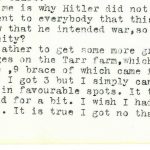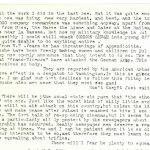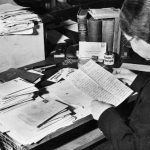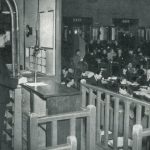“What puzzles me is why Hitler did not force war a year ago, when it was quite evident to everybody that this country was not ready? It is clear now that he intended war, so why did he not take so favourable an opportunity?”
The opening thoughts of Graham echo those of Prime Minister Neville Chamberlain, who in a letter in December 1939 wrote “I stick to the view I have always held that Hitler missed the bus in September 1938. He could have dealt France and ourselves a terrible, perhaps mortal, blow then. The opportunity will not recur”. Due to previous disarmament policies adopted by the British government following World War One, the branches of the military and the country itself were significantly inferior to many nations, including Germany, and these contemporary views expressed from Graham and Chamberlain are largely agreed upon by historians subsequently. How may the war have turned out had it been instigated a year earlier?
Graham goes on to give details of his day, which involved shooting to which he admits he likes to do to keep his mind off events further afield. Sadly, by his own admission he “cannot walk at all” owed to suffering from arthritis, which hindered him greatly in later life. He also recollects, in contrast, all the things he was doing between 1914-1918, and the lack of appreciation he felt he and others received. “It is true that I got no thanks nor indeed expected any for all the work I did in the last one. But it was quite enough to know that one was doing ones very hardest, and best, and the training of about 5000 company commanders was something anyway, apart from the retreat from Mons, the Marne the Aisne and later at the Railway triangle near La Bassee”.
Thomas then again displays his contempt and distrust for Germany, from their continued bombings in Poland, to their claims that they won’t use gas on their enemies (Won’t they?! Just wait a bit!”), and that they were not to blame for the outbreak of the war.
Concluding his thoughts for the day, he refers to the topic of press censorship, which had been the forefront of the news over the preceding days. The events of the 11th and 12th September 1939 were a defining moment for British censorship throughout the war. On the afternoon of 11th September, it was wrongly announced on a French radio broadcast that British Expeditionary Forces were engaged in combat with German troops. The location of the BEF had been secret and this leakage of (incorrect) information caused the British government serious issues. What followed was a chaotic few days with disagreement between The Ministry of Information and the War Office, who wanted retrospective censorship and forced a blockade on Fleet Street. The fact that the Ministry was responsible both for the issuing and censorship of news exacerbated the problem, and it was stripped of this responsibility the following month when it became clear the two were not working. Discussions surrounding the boundaries between the production and regulation of news has been a well-debated topic in the years since.
As always, Thomas makes his views on the matter clearly understood! He states “a particularly silly protest by the newspapers about the censorship has occurred. Really newspaper men deserve a real good thrashing at times. You and I can be patient when it is so clearly in ALL our interests to be so, and therefore they must learn to be and to cease squealing about trifles”.
Sources used:
The Impact of Hitler. British Politics and British Policy. 1933-1940, Maurice Cowling
https://history.blog.gov.uk
https://wikipedia.org
www.theconversation.com
www.nationalarchives.gov.uk
www.london.ac.uk



